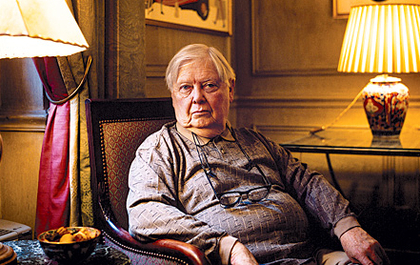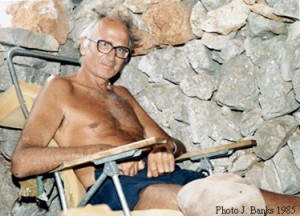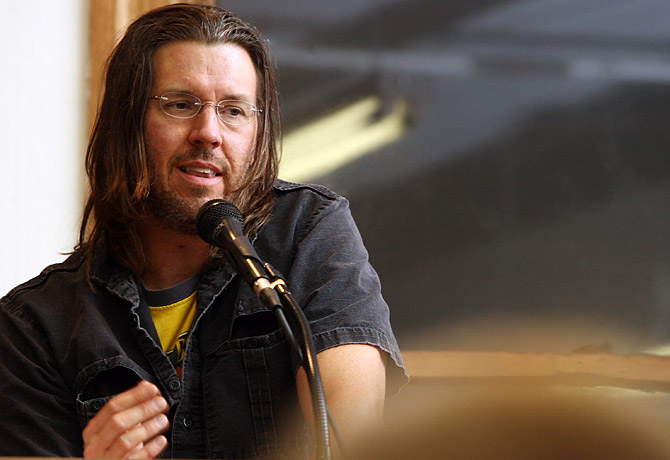GIANT Excerpt: from The Dance of No Hard Feelings by Mark Bibbins (#4)
tricks the boat. Even at night,
colors freeze when they would
rather bleed. He likes delay,
He says, the long ascent to sex.
[first his finger to his lips]
He of the somewhere-wadded-up
mainsail, half hard and too tired
[to the knuckle now] to try–
when in doubt he demurs
then dissolves, spooked
as I and twice as strange.
The glass we handed back
and forth sits on the sill:
mouth- and fingerprints
overlap, more reasonable
as a form of mimesis [out now
and glistening] than simple
trajectory–and what about
the bridge, under which
the boat [back in, slowly,
slowly] has slipped, its
chain of lights, distorted
by the edge of the glass,
just now turned out?
All this week, HTMLGiant will be posting poems from The Dance of No Hard Feelings (Copper Canyon) Mark Bibbins’s eagerly and long-awaited followup collection to 2003’s Sky Lounge. Day #1 is here. Day #2 is here. Day #3 is here. Check back daily for fresh doses.
a paragraph i’d kill to have written
He woke with the undersides of his eyelids inflamed by the high sun’s hammering, looked up to a bland and chinablue sky traversed by lightwires. A big lemoncolored cat watched him from the top of a woodstove. He turned his head to see it better and it elongated itself like hot taffy down the side of the stove and vanished headfirst in the earth without a sound. Suttree lay with his hands palm up at his sides in an attitude of frailty beheld and the stink that fouled the air was he himself. He closed his eyes and moaned. A hot breeze was coming across the barren waste of burnt weeds and rubble like a whiff of battlesmoke. Some starlings had alighted on a wire overhead in perfect progression like a piece of knotted string fallen slantwise. Crooning, hooked wings. Foul yellow mutes came squeezing from under their faned tails. He sat up slowly, putting a hand over his eyes. The birds flew. His clothes cracked with a thin dry sound and shreds of baked vomit fell from him.
Suttree, Cormac McCarthy
GIANT EXCERPT: from The Dance of No Hard Feelings by Mark Bibbins (#2)
with D.A. Powell
I used to have the shampoo
by the balls but the wind hurt my hair so.
I can’t get over that retarded girl on the trike,
can’t find the apes in the apiary
can’t get hard for the hardtack
and the cannery is closed.
Well, this is just a trumped-up way of saying
your haircut is among the finest in Wyoming.
From the brightly arranged parlors of San Francisco
to the uncompromising river, beside which, huskily, we sang,
you can modify an adverb with an adverb–they do it all the time in France–
but I have not left my room in thirty years.
My life is shrinking like a desiccated organ,
wilted japonicas drenched in wine.
All this week, HTMLGiant will be posting poems from The Dance of No Hard Feelings (Copper Canyon) Mark Bibbins’s eagerly and long-awaited followup collection to 2003’s Sky Lounge. Day #1 is here. Check back daily for fresh doses.
GIANT EXCERPT: from The Dance of No Hard Feelings by Mark Bibbins (#1)
Wrong decisions are harder to make than most
people realize, tears flying sideways in a gale.
We swerve in the road so as not to hit dead things,
but I used to know someone who did the opposite.
He liked to drive through them. Stars are most
serious when seen from the back of a pickup truck
while very very drunk, and if someone kisses you
there it doesn’t count. I would grab your sadness
as a movie monster would, bring it to the harshest
part of the mountain: I haven’t seen this place yet
but I am told weeping is not part of its economy
and everything there is delicious if eaten alone.
All this week, HTMLGiant will be posting poems from The Dance of No Hard Feelings (Copper Canyon) Mark Bibbins’s eagerly and long-awaited followup collection to 2003’s Sky Lounge. Check back daily for fresh doses.
FORECAST 42: CHAPTER 19 by Shya Scanlon
![]()
Forecast is being serialized semiweekly across 42 web sites. For a full list of participants and links to live chapters, please visit www.shyascanlon.com/forecast.
In her dream they were still together. Unhappy. Asseem scowled at Helen, clearly blaming her for the movement of her arms down the sides of her body and onto her back. Her fingers poked and prodded, roaming freely as her hands pulled them across the fenceless farm of skin. The couple was in an immaculate bedroom, and as Asseem stared at her in disgust he walked around and picked at small scabs on the wall. She tried to speak, but her accent was so thick she couldn’t understand herself—some kind of vowel-heavy heaving and moaning, a familiar word escaping now and then only to be pulled back in, kicking and screaming, to the vague morass of soupy sounds. She watched as he made his way from one side of the room to the next, the open sores behind him oozing, pus running down the walls. She looked out the window. Rain was coming down in puddle-size drops, and she began to hear it on the roof, a series of thunderous beats that blended into a steady roar and shook the walls. Helen looked back at Asseem and again tried to speak, to call out above the noise, but her voice was entirely drowned out by the rain, and her boyfriend continued to pick scabs and stare cruelly, his judgment distorting his face so much it took on twenty years, growing older as she watched. Then the puss began to take shape. It slowly pooled together at Asseem’s feet and formed into the bric-a-brac of childhood, cluttering the floor. Helen tried to stand, wanting to plug the leaking holes, but she was held in place by her arms, their white knuckles blending in with the bleached cotton sheets. The sound of the rain grew louder, Asseem’s scowl deepened, and the floor was filling up, now a sea of small objects: toy cars, pens and pencils, stuffed animals and books along side so much trash. It was climbing up her boyfriend’s legs, building beneath him as he dug deeper into the walls, his eyes now filled with a blank stare that was not, she realized, looking at her, but past her, through her. He was being consumed. Fearing for Asseem’s life Helen began to yell, to overwhelm the room’s racket with her own, and though she could still not understand her words she could begin to pick her sound out within the cacophony and it grew, louder than the beating rain, louder than the mounting rumble of debris until at last it finally broke like a fever at its peak and all sound stopped.
Working Definitions?

Poetry can thus be defined as the art of language, as distinguished from fiction which is the art of written narrative, from drama, the art of theatrical narrative, or from the essay, the art of written rhetoric.
There are only two modes in which any genre can be written, prose and verse. Prose is unmetered language; verse is metered language. Any of the genres can be written in either of the modes; that is, there are prose narratives and verse narratives, prose dramas and verse dramas, prose essays and verse essays. Likewise, there are prose poems and verse poems.
There is, thus, only one logical answer to the question “What is the difference between poetry and prose?” Poetry is a genre, and prose is a mode.
–from pages 4-5 of The New Book of Forms: A Handbook of Poetics (1986) by Lewis Turco
Paragraphs That Make Me Warm (6): William Gass

Now the horse was quiet and we were breathing careful and if the wind had picked up we couldn’t hear it or any snow it drove. It was warmer in the barn and the little light there was was soft on hay and wood. We were safe from the sun and it felt good to use the eyes on quiet tools and leather. I leaned like Hans against the wall and put my gun in my belt. It felt good to have emptied that hand. My face burned and I was very drowsy. I could dig a hole in the hay. Even if there were rats, I would sleep with them in it. Everything was still in the barn. Tools and harness hung from the walls, and pails and bags and burlap rested on the floor. Nothing shifted in the straw or moved in hay. The horse stood easy. And Hans and I rested up against the wall, Hans sucking in his breath and holding it, and we waited for Pa, who didn’t make a sound. Only the line of sun that snuck under him and lay along the floor and came up white and dangerous to the pail seemed a living thing.
– from ‘The Pedersen Kid’ in In the Heart of the Heart of the Country, pg. 60
God’s Hazard, Power Excerpt (?)
 Nicholas Mosely served in Italy during World War II. His first book was published in 1951.
Nicholas Mosely served in Italy during World War II. His first book was published in 1951.
His first book is old enough to be your grandfather.
I’ve been meaning to check out Mosley for some time. He’s intimidating, though—has been writing for quite some time, has stacked up a pretty large bibliography.
God’s Hazard is a 2009 novel published by Dalkey Archive. I am tired today because I started the book before bed last night, and stayed up an hour later than usual to continue reading it.
I will try to talk about it in depth in a couple of days when I finish it. Until then, here’s a section. Screw context. READ MORE >
From the Balki Bartokomous wiki
One episode had Larry going duck hunting and the normally gentle Balki surprisingly asks to come along, out of an intense hatred for ducks, which are regarded as vicious predators on Mypos. The description he gives of the ducks on Mypos later in the episode, however, implies that in fact Pterodactyls still exist on the island.
Paragraphs I… … (5): David Foster Wallace

The withered priest reads his lecture about Vermeer and limpidity and luminosity and about light as attachment/vestment to objects’ contour. Died 1675. Obscure in his time you see for painted very few. But now we know do we not, ahm. Blue-yellow hues predominate as against ahm shall we say de Hooch. The students wear blue blazers. Unparalleled representation light serves subtly to glorify God. Ahm, though some might say blaspheme. You see. Do you not see it. A notoriously dull lecturer. An immortality conferred upon implicit in the viewer. Do you ahm see it. ‘The beautiful terrible stillness of Delft’ in the seminal phrase of. The hall is dark behind Day’s glowing row. The boys are permitted some personal expression in choice of necktie. The irreal evenness of focus which transforms the painting into what glass in glass’s fondest dreams might wish to be. ‘Windows onto interiors in which all conflicts have been resolved’ in the much-referenced words of. All lit and rendered razor-clear you see and ahm. It meets TuTh after lunch and mail call. Resolving conflict, both organic and divine. Flesh and spirit. Day hears an envelope ripped open. The viewer sees as God sees, in other ahm. Lit up throughout time you see. Past time. Someone snaps gum. Whispered laughter somewhere up in a rear row. The hall is dimly lit. A boy off to Day’s left groans and thrashes in a deep sleep. The teacher is, it is true, wholly dry, out of it, unalive. The boy next to Day is taking a deep interest in that part of his wrist which surrounds his watch.
– from ‘Church Not Made With Hands’ in Brief Interviews with Hideous Men, pp. 203-04
